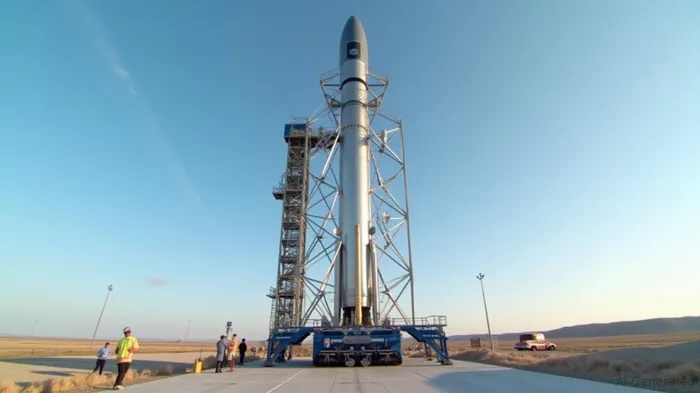Infrastructure of the Future: Jeff Bezos' Investments in Space and Renewables Signal a New Era of Profitable Innovation
Jeff Bezos' post-Amazon era has seen a sharp pivot toward two high-stakes sectors: space technology and renewable energy. Far from speculative bets, his investments—spanning Blue Origin's rocket infrastructure to AI-driven climate solutions—reflect a deliberate strategy to build the foundational systems of tomorrow. For investors, this signals a golden opportunity to align with a visionary approach to sustainability and technological progress, even as markets grapple with near-term volatility.
The Space Race 2.0: Building the “Internet of the Skies”
Blue Origin, Bezos' space venture, is no longer just about suborbital tourism. Instead, it's positioning itself as the infrastructure backbone of the next space economy. The New Glenn rocket, designed to slash launch costs by a factor of 100, aims to democratize access to space—much like early internet infrastructure transformed global connectivity.

Bezos' recent acquisition of land near Hawaii's Space Force tracking stations underscores his focus on strategic real estate for orbital logistics and national security. Such moves mirror the 1990s “picks-and-shovels” mentality of investing in the tools that enable broader adoption, not just the end-user applications.
Investment Insight:
While Blue Origin remains private, public firms like Rocket Lab (RKLB) or Maxar Technologies (MAXR), which specialize in satellite infrastructure and space robotics, offer exposure to this theme. Consider pairing these with exposure to materials science (e.g., Alcoa (AA) for lightweight aerospace alloys) to benefit from the sector's supply chain needs.
The Climate Tech Boom: AI as the New Engine of Sustainability
Bezos' $10 billion Bezos Earth Fund has evolved into a laboratory for AI-driven climate solutions. Recent grants, such as Yale's Carbon Sim project and Cornell's EV Charging Optimization tools, highlight a shift toward data-centric, scalable solutions over flashy greenwashing projects. For instance, AI models now predict optimal carbon capture sites, while drone systems track illegal logging in real time—a far cry from the “build it and hope it works” approach of earlier decades.
The fund's Phase II grants, expected in late 2025, will scale these projects into commercial applications. This mirrors Bezos' early AmazonAMZN-- strategy: invest heavily in logistics (e.g., AWS cloud infrastructure) before monetizing through e-commerce. Similarly, today's climate tech investments are laying the groundwork for future decarbonization markets.
Investment Advice:
Focus on AI infrastructure plays, such as NVIDIA (NVDA) for compute power, or Wipro (WIT) for AI-as-a-service in sustainability. For thematic exposure, the Invesco Solar ETF (TAN) or iShares Global Clean Energy ETF (ICLN) provide diversified access to renewable energy.
The Synergy: Space Tech and Climate Tech as Twin Pillars
Bezos' investments reveal a symbiotic relationship between the two sectors. AI tools honed for climate monitoring (e.g., wildlife tracking via audio analysis) are equally vital for space missions, such as analyzing lunar soil samples. Meanwhile, energy storage innovations for renewables—like those in Tesla (TSLA)'s Powerwall—parallel the need for sustainable propulsion in space travel.
Why Now? The Case for Long-Termism in Volatile Markets
Critics argue that space and climate tech are “moonshots” with uncertain timelines. Yet Bezos' track record—turning Amazon's early losses into a trillion-dollar empire—suggests patience pays off. Both sectors are now at inflection points: global decarbonization targets (e.g., the EU's 2035 EV mandate) and NASA's Artemis program ensure sustained demand for infrastructure.
Investment Takeaway:
Allocate 5–10% of a portfolio to high-conviction, infrastructure-oriented climate and space firms. Prioritize companies with:
1. Scalable, data-driven models (e.g., fusion energy pioneers like Commonwealth Fusion Systems).
2. Government partnerships (e.g., Blue Origin's NASA ties).
3. Focus on enabling technologies, not just end products.
Conclusion: The Next Decade's Winners Will Be Built on Today's Foundations
Jeff Bezos' investments are a masterclass in first-principles thinking: solving foundational problems (launch costs, carbon removal) to unlock exponential growth. For investors, this means looking beyond quarterly earnings and embracing sectors where innovation is systemic, not incremental.
The road will be bumpy—space startups face technical hurdles, and climate tech's ROI timelines are long. But as Bezos' own journey shows, the rewards for building the “picks and shovels” of the future are unmatched. The question isn't whether these sectors will dominate—it's whether you'll be on the right side of the investment equation.
Disclosure: The author holds no positions in the companies mentioned.
Tracking the pulse of global finance, one headline at a time.
Latest Articles
Stay ahead of the market.
Get curated U.S. market news, insights and key dates delivered to your inbox.

Comments
No comments yet